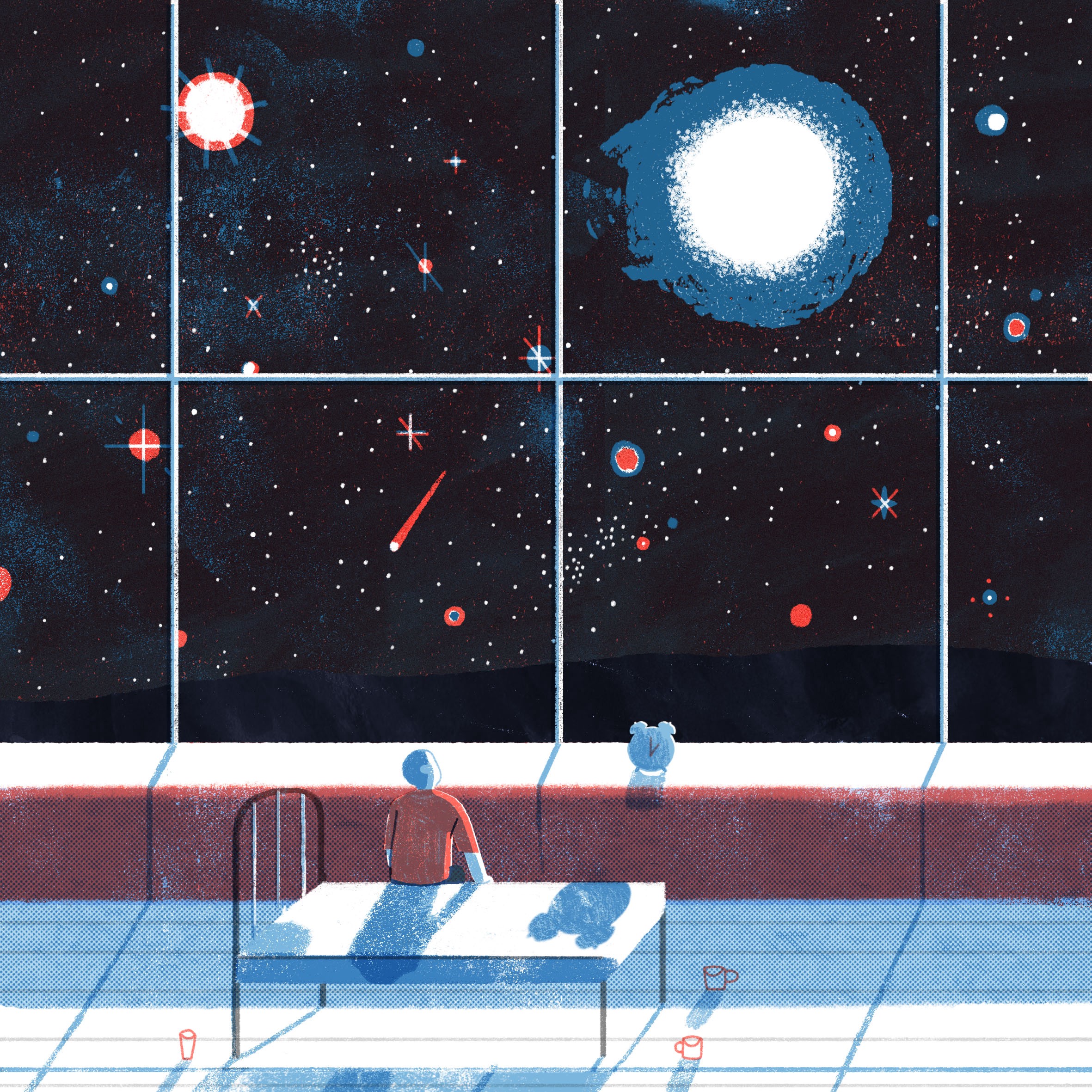 Illustration: Kieran Blakey
Illustration: Kieran Blakey
The Nuance
The science behind that silent, malfunctioning alarm clock in your brain
![]()
Markham Heid
Jan 95 min read
It?s three a.m., but you don?t need to check your phone to know that.
You know it?s that time because you always wake up at three a.m. It?s like your brain is equipped with a silent, malfunctioning alarm clock that rings you awake each night despite your earnest intention to sleep soundly for a full eight hours.
The funny thing is that everyone wakes up multiple times each night. But in most cases, these middle-of-the-night arousals are so brief and shallow that the brain doesn?t recall them in the morning.
?The average adult awakens seven to 15 times each night, and this is normal,? says Michael Perlis, director of the Behavioral Sleep Medicine Program at the University of Pennsylvania?s Perelman School of Medicine. He says these arousals tend to be ?amnestic,? meaning a person doesn?t usually remember them. They last anywhere from a few seconds to a few minutes, and they usually coincide with transitions from one sleep stage to another. ?Exactly why these happen is up for debate,? Perlis says. ?But you tend to shift your body position when you have these brief awakenings, and that?s a good thing.? If your sleeping body were completely motionless all night long, this prolonged period of stasis could lead to skin sores, loss of muscle tone, or other issues that arise in people who are bedridden and unable to move due to illness or infirmity, he says.
But for some people, one or more of these middle-of-the-night arousals are neither short nor amnestic. And there are several common explanations for these predictable awakenings.
Perlis says sleep-related anxiety is one possibility. If someone is anxious about getting a good night?s sleep, their brain may be on high alert for periods of wakefulness. When one of those shallow, run-of-the-mill awakenings happens following the night?s first cycle of deep sleep, an anxious brain may take notice with an ?oh, shoot? emotional reaction. Perlis says this may cause a person to wake up more fully and for a longer period of time than is typical. And because sleep stages tend to happen at regular intervals, this sort of anxiety-induced arousal could happen at the same time each night.
Alcohol is another prime suspect. ?Immediately after you consume alcohol, it actually enhances sleep,? says Timothy Roehrs, director of research at the Sleep Disorders and Research Center of Henry Ford Health System in Detroit. ?So you fall asleep faster if you?ve been drinking, and for at least three to five hours, your sleep might be deeper.? But for reasons that researchers haven?t yet nailed down, the breakdown and clearance of alcohol from a person?s bloodstream has an alerting, arousing effect. ?People have suggested that wakefulness brain chemicals are stimulated when alcohol is metabolized, but that?s never been clearly demonstrated,? Roehrs says.
If you fill each night?s sleepless hours clearing your email backlog or engaging in other tasks that you can?t find time for during the day, you?re encouraging your brain to wake up.
While small amounts of alcohol ? a drink or two ? usually aren?t enough to disrupt sleep, moderate or heavy alcohol intake can have this arousing effect. The process by which the body metabolizes alcohol doesn?t vary much. And so if your drinking and bedtime routines are consistent, you?re likely to wake up at the same time each night, Roehrs says.
Medical issues could also cause a person to wake up at a predictable hour. Perlis mentions gastroesophageal reflux disease (GERD) as one condition that can cause ?middle insomnia,? which is the term sleep doctors use for middle-of-the-night sleeplessness. Some other symptoms of GERD include a persistent cough or heartburn, but Perlis says it?s often the case that people with GERD have no daytime symptoms.
Obstructive sleep apnea (OSA) is another possibility. ?This is a disorder that is much more common than most people realize,? says Michael Grandner, director of the Sleep and Health Research Program at the University of Arizona College of Medicine, Tucson. For people with OSA, the muscles of the throat relax during sleep, and this can close off airways. Breathing can stop for 10 seconds or longer, which can cause the sleeper to wake up.
Grandner says that OSA and other medical problems, including pain disorders, can wake someone at the same time each night because of the predictable nature of sleep?s cycles. Deep, non-REM sleep stages tend to be longest at the start of the night. So it?s common for a person to sleep through the symptoms of an ailment for the first three to five hours of the night and then wake up when this initial deep-sleep stage transitions into a lighter REM stage, he says.
How can you tell if your middle insomnia is caused by a medical problem? Perlis offers a rough rule of thumb: If you can recall five or more awakenings each night, and each seems to last no more than a few minutes, that?s indicative of a medical issue. If you tend to wake up once or more for a longer period of time, that?s probably something else.
Yet another cause of middle insomnia could be the activities a person takes up when they?re not sleeping. ?I tell patients not to give insomnia a function,? Perlis says. If you fill each night?s sleepless hours clearing your email backlog or engaging in other tasks that you can?t find time for during the day, you?re encouraging your brain to wake up each night so you can get those chores done, he says. That?s bad. And again, the reliable time course of sleep?s cycles can cause these sorts of awakenings to occur at the same time each night.
What can you do to fix your middle insomnia? The solutions depend on the cause. If alcohol?s your issue, try cutting back. If a medical problem seems to be present, see your doctor. But if anxiety or other psychological issues are your problem, Perlis says cognitive behavioral therapy for insomnia (CBT-I) is the first-line treatment. This is a form of expert-guided psychotherapy coupled with behavioral interventions like sleep restriction and some elements of sleep hygiene. ?CBT-I is magic,? Perlis says. ?But it?s not a do-it-yourself therapy.?
If your middle-of-the-night arousals aren?t regular or severe enough to warrant a trip to a sleep specialist, Perlis says the best thing you can do is ?absolutely nothing.? By that, he means don?t sleep in late, don?t take naps, and don?t try to make other changes to your routine in an effort to catch up on lost sleep. Within two to five days, he says, your problem should resolve itself. ?If you build up enough sleep debt, the ship will right itself,? he says.


